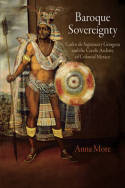Baroque sovereignty
Carlos de Sigüenza y Góngora and the Creole Archive of colonial Mexico
- ISBN: 9780812244694
- Editorial: University of Pennsylvania Press
- Fecha de la edición: 2013
- Lugar de la edición: Pennsylvania. Estados Unidos de Norteamérica
- Encuadernación: Cartoné
- Medidas: 24 cm
- Nº Pág.: 448
- Idiomas: Inglés

In the seventeenth century, even as the Spanish Habsburg monarchy entered its irreversible decline, the capital of its most important overseas territory was flourishing. Nexus of both Atlantic and Pacific trade routes and home to an ethnically diverse population, Mexico City produced a distinctive Baroque culture that combined local and European influences. In this context, the American-born descendants of European immigrants-or creoles, as they called themselves-began to envision a new society beyond the terms of Spanish imperialism, and the writings of the Mexican polymath Carlos de Siguenza y Gongora (1645-1700) were instrumental in this process. Mathematician, antiquarian, poet, and secular priest, Siguenza authored works on such topics as the 1680 comet, the defense of New Spain, pre-Columbian history, and the massive 1692 Mexico City riot. He wrote all of these, in his words, "out of love for my patria." Through readings of Siguenza y Gongora's diverse works, Baroque Sovereignty locates the colonial Baroque at the crossroads of a conflicted Spanish imperial rule and the political imaginary of an emergent local elite. Arguing that Spanish imperialism was founded on an ideal of Christian conversion no longer applicable at the end of the seventeenth century, More discovers in Siguenza y Gongora's works an alternative basis for local governance. The creole archive, understood as both the collection of local artifacts and their interpretation, solved the intractable problem of Spanish imperial sovereignty by establishing a material genealogy and authority for New Spain's creole elite. In an analysis that contributes substantially to early modern colonial studies and theories of memory and knowledge, More posits the centrality of the creole archive for understanding how a local political imaginary emerged from the ruins of Spanish imperialism.






